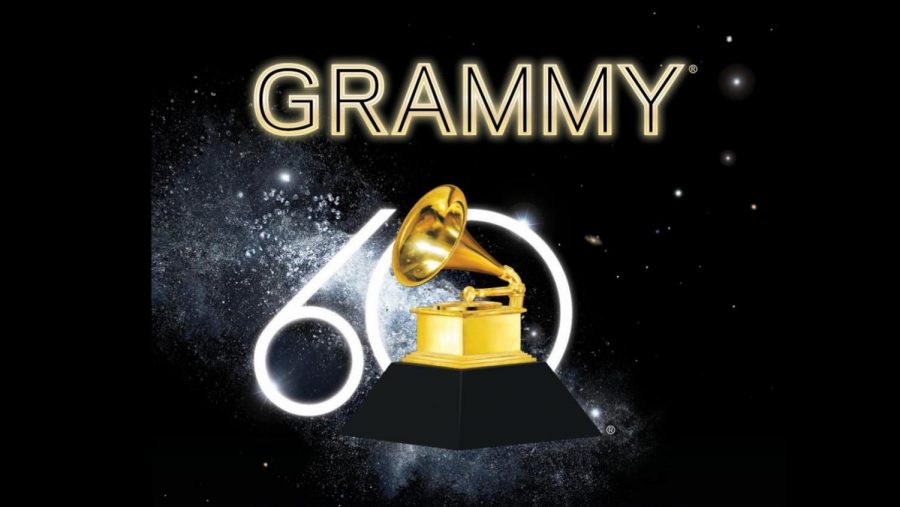Commentary: 60th annual Grammy Awards
January 30, 2018
“I have always loved the Grammys but to have the artists read the Fire and Fury book killed it,” United Nations Ambassador Nikki Haley tweeted after the 2018 Grammy Awards. “Don’t ruin great music with trash. Some of us love music without the politics thrown in it.”
What she comments on in her tweet was a segment in which artists like John Legend and Cardi B read excerpts from the book Fire and Fury. It was the most out of place political moment of the awards show. But it was funny. And with a host like James Corden, you would expect there to be at least one moment like Hillary Clinton’s attempts to embed herself into pop culture are finally successful and humorous.
To even imply that music has ever been isolated from politics is both incorrect and insulting. Quality art comments and reflects on the society it is created in and for many artists, not just those in music, politics has been a major focus of their work. In today’s political climate, it is important for musicians to use their platforms to speak on the issues that they feel deserve attention. Many artists took advantage of their position on the Grammy stage Sunday night.
Kendrick Lamar has always been known for societal commentary in his songs. The critically acclaimed, highly nominated and commercially successful album “DAMN.” was a perfect example of his ability to make a political statement carefully embedded in clever lyrics and insane rhymes. His opening act featured an American flag backdrop, faceless troops and comedian Dave Chappelle interrupting the performance from time to time.
“I just wanted to remind the audience that the only thing more frightening than watching a black man be honest in America, is being an honest black man in America,” Chappelle said in the middle of Lamar’s performance. “Sorry for the interruption. Please continue.”
Political.
Camila Cabello, who is an immigrant herself, gave a stirring speech on the importance of passing legislation to save DACA and protect the Dreamers, people who were brought to the U.S. illegally as minors.
“I’m a proud Cuban-Mexican immigrant, born in Eastern Havana, standing in front of you on the Grammy stage in New York City, and all I know is, just like dreams, these kids can’t be forgotten and are worth fighting for,” Cabello said.
Political.
Support for the Time’s Up movement was displayed through white roses on the red carpet and was mentioned in Janelle Monae’s powerful speech.
“We come in peace, but we mean business,” Monae said. “And to those who would dare try to silence us, we offer two words: ‘Time’s up.’ We say ‘Time’s up’ for pay inequality; time’s up for discrimination; time’s up for harassment of any kind. And time’s up for the abuse of power – because, you see, it’s not just going on in Hollywood; it’s not just going on in Washington. It’s right here in our industry, as well.”
Political.
While I am glad that the movement is still a focus of public attention, its message was deeply contrasted by the utter lack of women receiving awards and performing during the Grammys.
The only woman to win an award onair was Alessia Cara for Best New Artist (I won’t get in on my opinion on her win as to not stray from the topic of this commentary).
Lorde was noticeably absent from the stage after she declined to perform in a group act. Of all the nominees for Album of the Year, she was the only one not offered a solo performance spot.
In the Best Pop Solo Performance category, which included Kesha’s “Praying,” a song about freedom from abuse and disenfranchisement, as well as songs by four other woman nominees, Ed Sheeran won for “Shape of You.”
A song describing physical attraction to a random woman in a bar over trashy guitar instrumentals won over four powerful and moving songs by talented artists.
Women should not win simply because they are a woman or because female empowerment is gaining public approval. They should win because they have produced quality art, which “Shape of You” is not.
The Recording Academy received public backlash on social media for the historical lack of female nominees to which the president, Neil Portnow responded with a statement declaring that female artists and producers need to “step up.”
“It has to begin with women who have the creativity in their hearts and their souls, who want to be musicians, who want to be engineers, who want to be producers, who want to be part of the industry on an executive level, to step up,” Portnow said.
Political.
As they should have, his words were received quite poorly. In an era where #MeToo and Time’s Up have dominated the news and social media, these were poor words. In a world where women should be valued equally as men, these were poor words.
Even in the absence of the skit Haley refers to, politics are embedded into music and culture. If you don’t like the two clashing, listen to classical music. If Mozart or Beethoven’s famous symphonies do comment on 18th-century European affairs you wouldn’t know and you wouldn’t care.







